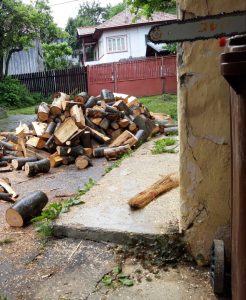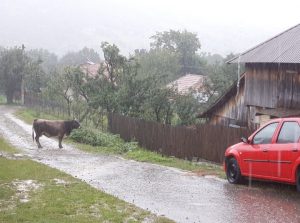Adopting a dog in Romania – Adopția unui câine în românia
To adopt a dog in Romania, you have 4 different things to think about : The choice, the education, the cost and how to bring it back. I will give you some more details about it.
So first of all, the choice :
The choice of your animal is the most important things because you spend like 10 to 15 years with him. You have to take into account of your own needs and the needs of your future dog. To choose the good dog, you have to feel this special link that you can have between you two. Having a dog is like having a kid. During all his life you will have to take care of him. In general, it’s better to adopt a dog who is from the street than from a shop. In the first option, you are saving a life. In Romania there is a lot of street dogs, it’s impossible to save all of them but if you can offer to one a better life, just do it.
There is a lot of different type of dogs with a lot of sort of personality. You have to choose one you will match with your life style. For example, if you are someone who like to move and to hike during long hours, don’t take a lazy dog and vice versa. Maybe try to search on Internet to know more about dogs and about how they are acting. This is some advice I can give you but if I’m talking about my own experience, it’s more the dog who is choosing you than the inverse.
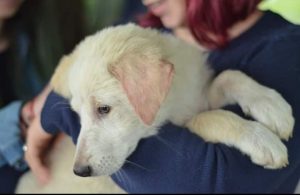
The second thing is the education :
As I said, having a dog is like having a kid. You can’t just let him do whatever he wants, it won’t work. Let’s imagine, you are eating and you dog come to eat your meal or you are away and when you come back he did a mess in your house. It won’t work. You have to take time to educate your dog, he is your responsibility. Take time, like 1 hour per day minimum to train your dog. Ask him to sit and to wait for the food, for example.
Also walk around with him, thanks to that you will be able to strengthen your links. It’s really important for the education. If there is no trust between you two, you can not work together.
After that there is the cost :
If you take a street dog or a dog from a breeder, the cost will vary. Anyway, you will have to do his passport, to put him a electronic chip and get vaccinated for rabies. This is the minimum to do for your new dog. But if you would like to go in another country with him, you have to check the law of this country. Each has is own particularity and it’s better to do everything to respect it. Otherwise your dog could be quarantined, at your expense.
During all the life of your animal you will have to pay things : the food, the veterinary if he has a problem, the renewal of the electronic chip,… It’s expensive to have a dog so you really have to take it into account, don’t think that it will be easy.
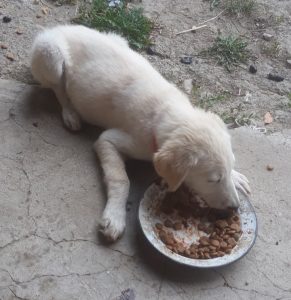
The last point is “How to bring it back in your country” :
To do that, you have to check the plane company. They all have different conditions but in every case, you will have to take a cage enough big for your dog and having all the condition I said before. Bringing a animal in the plane is really expensive so be sure that you have enough money and plan it long time before. Just make sure that your animal don’t risk anything.
If your dog is vaccinated and in order with his paper, you can also go back home by car, if you like long travel. For that plan enough water and food for the travel (for you as well) and don’t forget to make stop every 2 hours to refresh your mind and walk a bit with your dog.
So have a nice travel and have a nice life with your dog !
—
Pentru a adopta un câine în România, ai 4 lucruri diferite la care trebuie să te gândești: alegerea, educația, costul și cum să-l aduci înapoi. O să îți ofer mai multe detalii despre asta.
În primul rând, alegerea:
Alegerea animalului tău este cel mai important lucru, deoarece o să îți petreci între 10-15 ani cu el. Trebuie să iei în considerare și nevoile tale dar și nevoile viitorului tău câine. Pentru a alege câinele potrivit, trebuie să simți acea legătură specială pe care o puteți avea între voi. A avea un câine e ca și cum ai avea un copil. De-a lungul vieții lui va trebui să ai grijă de el. În general, e mai bine să adopți un câine al stăzii decât de la magazin. În prima opțiune, salvezi o viață. În România sunt foarte mulți câini ai străzii, e imposibil să îi salvezi pe toți, dar dacă poți să oferi unuia o viață mai bună, doar fă-o.
Sunt foarte multe tipuri diferite de câini cu o mulțime de personalități. Trebuie să alegi unul cu, care îți vei potrivi stilul de viața. De exemplu, dacă ești o persoană care îi place să se miște și să facă drumeții pe parcursul mai multor ore, nu lua un câine leneș și vice versa. Încercați să căutați pe internet și să aflați mai multe despre câini și despre modul în care se comportă. Acesta este un sfat pe care pot să ți-l dau, dar vorbesc din propria mea experiență, este mai mult câinele care te alege pe tine decât invers.
În al doilea rând, este educația:
Cum am spus, a avea un câine e ca și cum ai avea un copil. Nu poți să-l lași pur și simplu să facă ce vrea, nu o să funcționeze. Hai să ne imaginăm, tu mănânci și câinele tău vine și îți mănâncă mâncarea sau tu ești plecat și când vii el a făcut un dezastru în casă. Nu o să funcționeze. Trebuie să-ți iei timp să îți educi câinele, el este responsabilitatea ta. Ia-ți timp, cum ar fi o oră pe zi minim să îți dresezi câinele. Cere-i să stea și să aștepte mâncarea, de exemplu. De asemenea, plimbă-te cu el, mulțumită acestui lucru vă veți putea întării legăturile. Este foarte important pentru educație. Dacă nu există nicio încredere între voi doi, nu veți putea lucra împreună.
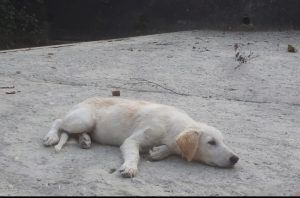
După aceasta este costul:
Dacă iei un câine al străzii sau de la un crescător, cheltuielile vor varia. În orice caz, va trebui să îi faci pașaportul, să îi pui un cip electronic și să îi vaccinezi pentru rabie. Acesta este minimul de făcut pentru câinele tău. Dar dacă dorești să pleci în altă țară cu el, va trebui să verifici legea acestei țări. Fiecare are particularitățile sale și este mai bine să faci totul ca să o respecți. Altfel câinele tău va fi quarantied, at your expense (în carantină, pe cheltuiala ta). De-a lungul vieții animalului tău va trebui să îi cumperi lucruri: mâncare; medicul veterinar, dacă are o problemă; reînnoirea cipului electronic….Este foarte costisitor să ai un câine, deci trebuie să ții cont de acest lucru, să nu crezi că o să fie ușor.
Ultimul punct este “Cum să-l aduci înapoi în țara ta”:
Pentru a face asta, trebuie să verifici compania avionului. Toți au diferite condiții, dar în fiecare caz va trebui să iei o cușcă destul de mare pentru câinele tău și să aibă toate condițiile pe care le-am spus înainte. Aducerea unui animal într-un avion este foarte costisitor, așadar fii sigur că ai bani suficienți și planifică asta cu mult timp înainte. Doar asigură-te că animalul tău nu riscă nimic.
Dacă, câinele tău este vaccinat și in ordine cu actele lui, poți să te întorci acasă cu mașina, dacă îți plac călătoriile lungi. Pentru that plan suficientă apă și mâncare pentru călătorie(pentru tine de asemenea) și nu uita să faci o oprire la fiecare 2 ore pentru ați reseta mintea și plimbă-te puțin cu, câinele tău.
Așa că, să aveți o călătorie plăcută și o viață frumoasă alături de câinele tău!
5 things when you are living in a rural area in Romania.
The house :
If you have a light sleep, it’s 5 am and you wake up because the rooster from the farm next door thought it would be a good idea to start the day at that time. Otherwise it’s 9 am and it’s time to get up.
First step, the bathroom. Living in a typically traditional house, this one isn’t really at the cutting edge of technology. If you are in winter, it’ll probably be very cold. It’s therefore strongly recommended to buy a small auxiliary heater. It’s also possible that you have no water but no panic, usually you’ve at best 30 minutes to wait and at worst 4 days. This often happens after a lot of rain, so take your precautions!
Once this step is completed, you should know that toilet paper don’t go into the toilet but into the next bin.
You should also know that in this type of house, there’s no centralized heating. You’ll therefore have to make a fire in each room if you want your house to be heated. For that you will obviously have to cut wood and dry it otherwise it will not take.
Despite all this, life in a traditional house is a very relaxing thing, life is simple and it’s very pleasant to wake up for example with a view of the mountains and a beautiful sunrise.
The transport service :
In Romania, in rural areas, transport isn’t very efficient. Sometimes you only have 2 or 3 buses during the day. It’s also true that trains are rather slow. So if you want to get somewhere as soon as possible, the best way is still to hitchhike. As everywhere it’s always advisable not to do it alone, but it’s always the easiest way to get from point A to point B.
However, if you want to take your time and enjoy your trip, I strongly recommend the train. You’ll have the opportunity to enjoy the wonderful landscapes that Romania has to offer. You’ll also meet many great people who will be happy to help you on your journey.
The language :
Being in another country it’s normal that you do not speak the same language. Romanian is a Latin language and has a lot of similarities with French, for example, so you can always try to make yourself understood. In rural areas, very few people understand and speak English, so it’s strongly recommended to learn a few words that will be useful to you such as: count to 10; say hello; or ask for directions. No matter how many mistakes you make, the person you’re talking to will usually be very happy if you make the effort to speak their language. So don’t hesitate to get started!
The shopping :
Generally in small villages, you can find many small shops. You can find the essentials there. It’s very convenient when you’re missing something. The disadvantage is that very few of them take the card. You will therefore constantly need to have change with you just to be sure.
What is also good in Romania are the “Second Hands Shops”. There are some everywhere and you can really find great and cheap things. In an average city there are usually at least 4-5 of them and if you’re in a small village just look around and you will certainly see at least one. Again, they do not normally take the card or so rarely fill up with change.
The food :
You can’t go to a country without tasting traditional food. There are many very different dishes but the main ingredient will often be meat. For a Romanian person a meal isn’t a real meal without meat. Even if you can eat meatless dishes like Mămăligă or Sarmale, which are made of corn and cabbage respectively.
Don’t hesitate to visit one of these small open markets to taste Mici and find fresh and local produce. During this short outing you will also see people selling alcohol in water bottles. These are Pălinca and Țuică, traditional alcohols made from fermented fruit (usually plumbs).
In Romania, you also have some special bakeries. Indeed, you can’t really get into it but you have to order what you want at a small window. Some are specialized in the sale of sweet products and others in salty products.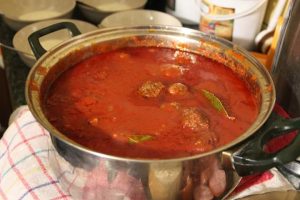
In short, don’t be afraid to make new experiences, you’ll be pleasantly surprised. Romania is a beautiful and welcoming country!
5 favorite outdoor games from my childhood that anyone can play
When I was young, I was scout. We spent a lot of time outdoor to play at several game.
Some of them are engraved in my mind like these 5:
- ” The bandmaster “
Everybody is in a circle. We choose one who will be “ the detective “. His goal is to find the bandmaster who is hidden among the musicians. The detective goes out of the circle to not see when the group choose ” the bandmaster “. The goal of the bandmaster is to do some movements that all the group follows, anything he wants without being spotted by the detective. He can change the movement when he wants but with care so the detective won’t see him!
The game starts, the bandmaster does a movement and everybody reproduces it. The detective comes back in the circle and tries to find the bandmaster. When he finds him, the game ends and we can restart with two other people.
- ” The mouse and the cat “
Everyone is in pairs, dispersed all over in the room/field and all of them are mice. Two participants are alone. One is the cat, the other one is also a mouse. The goal of the cat is to touch the mouse. Like this the mouse becomes the cat and vice-versa. To not be caught, the mouse needs to find a partner. For that he goes next to a couple and grabs the arm of the person just next to him. As it’s impossible to be three in a pair, the one at the opposite end needs to leave and start to run to not be caught by the cat. The game ends whenever loose interest.
- ” The king of the silence “
Everybody is in a circle, sitting or standing, it doesn’t matter. One person is “the king of the silence”, he’s sitting in the middle of the circle, eyes closed, trying to protect his treasure that is placed around the king (or under if he’s on a chair). The goal of the other people in the circle is to take the treasure. In order to do that, one by one, they go in silence to try to take it. If they do too much noise, the king is able to point them with his finger and they need to go back to their place. The game ends when the king’s treasure is stolen. The person who stole it becomes the new king and the game restarts.
- ” The wizards “
In this game, we have some wizards and the others are muggles. The goal of the wizards is to catch the muggles. When they touch them, the muggles petrify and cannot move anymore. The game ends when all muggles are petrified. But they’re able to be healed, if another muggle touches them and frees them.
- “The little goldfish”
In this game, there is a little goldfish standing in front of the others.
The goal of the other child is to get in line with him (a few meters away) and to try to cross the other side without getting touched. If they get touched, they become small goldfish and join the first fish. To do this, the children must shout: “Little goldfish, can we cross the Red Sea, if we have …?” And the little goldfish has to find a color that no one has to be able to touche a maximum of people. If someone has the color that the little goldfish has mentioned before, he can pass without fearing anything. But if a person doesn’t have the color she will have to run to try to pass the other side of the sea. The game ends when everybody is a little goldfish.
Portret de voluntar – Emilie (Belgia)
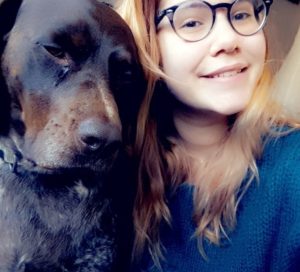
Hi,
My name is Emilie ! I’m 23 years old and I come from Belgium in a village near France.
After high school, I did one year of graphic design and one year to be a preschool teacher. Not knowing what I really want to become I started working. I did barmaid in a tennis club but that’s not suited me. When my contract ended, I wanted to do something completely different to change my life. In December, I decided to be a volunteer and to travel. I was very attracted by the beautiful landscape of Romania and by the cultural shift between Belgium and Romania. What makes me here today and I intend to live my ESC thoroughly!
I’m really open minded. I love animals and especially dogs. My passions are painting, drawing, reading and music. My goal in being here is to be less shy and to be more open to others. I want to improve my English as well. I like being in touch with nature, it’s something that attracts me a lot since I’m a pretty stressed person. I love to laugh with people too, I think it’s the way to create some links.
I hope that I’ll be able to surpass myself and do my best to evolve.
See you around!
Salutare, eu sunt Emilie, am 23 de ani și vin dintr-un sătuc din Belgia de la granița cu Franța.
După liceu, am studiat un an design grafic și apoi un an de învățământ primar. Deoarece nu prea știam ce îmi doresc să fac am început să lucrez. Am fost barmaniță la un club de tenis, dar nu era ce voiam. Când mi s-a terminat contractul, am vrut ceva complet diferit, ceva ce îmi va schimba viața. În decembrie am decis că vreu să fac voluntariat și să călătoresc. Am fost atrasă de peisajele frumoase din România și de diferențele culturale majore între Belgia și România. Toate astea m-au determinat să fiu aici azi și inenționez să trăiesc experiența ESC la maxim!
Sunt deschisă la mine. Îmi plac animalele, cu precădere câinii. Pasiunile mele suntpictura, desenul, cititul și muzica. Țelul meu, fiind aici este să fiu mai puțin timidă și mai deschisă spre ceilalți. Și îmi doresc să îmi îmbunătățesc nivelul de engleză. Îmi place să fiu în contact cu natura, e ceva ce mă atrage, din moment ce sunt o persoană destul de stresată. De asemenea îmi place să râd cu oamenii și cred că e o metodă bună de a crea legături.
Sper că voi fi capabilă să mă depășesc pe mine însurmi și să evoluez.
Ne vedem!
===
Emilie este în România pentru o perioadă de nouă luni, din martie 2019 până în noiembrie 2019, în cadrul proiectului #Stronger Together 2.0 [2018-1-BE05-ESC11-002534] proiect co-finanțat de Uniunea Europeană prin Programul European Solidarity Corps și implementat în România de către Curba de Cultură.
